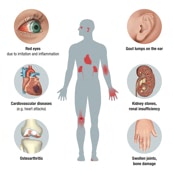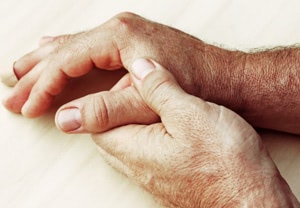How does gout affect the body?
Gout needs to be treated as early as possible and consistently, otherwise it can lead to various complications.
Joint damage
The feet and hands are the most affected regions, followed by the elbows and knees; this results in significant reductions to the patient's mobility. The affected bones and joints are also more likely to break.
Damage to these affected areas is irreversible. Permanent pain, loss of movement and deformation of the joints may occur.
Kidney damage and kidney stones
Uric acid crystals are commonly deposited in the kidneys, further obstructing the outflow of uric acid, which leads to the formation of kidney stones. This makes the urine even more acidic, which in turn can lead to the increased formation of kidney stones. Every additional deposit of uric acid crystals presents a risk to the joints due to the inflammation it can trigger.
If the disease is not treated appropriately, these inflammations can eventually cause severe kidney damage, which may lead to kidney failure.
Cardiovascular risk
Hyperuricaemia and gout are also connected to an increased risk of high blood pressure (hypertension). Hypertension damages the blood vessels and can increase the risk of heart disease and stroke. Gout patients should be monitored regularly for cardiovascular disease. The new ESC/ESH guidelines on the management of hypertension include hyperuricaemia as a cardiovascular risk factor.

Gout's effect on the body
Learn more about the damage gout can do to different parts of the body.

